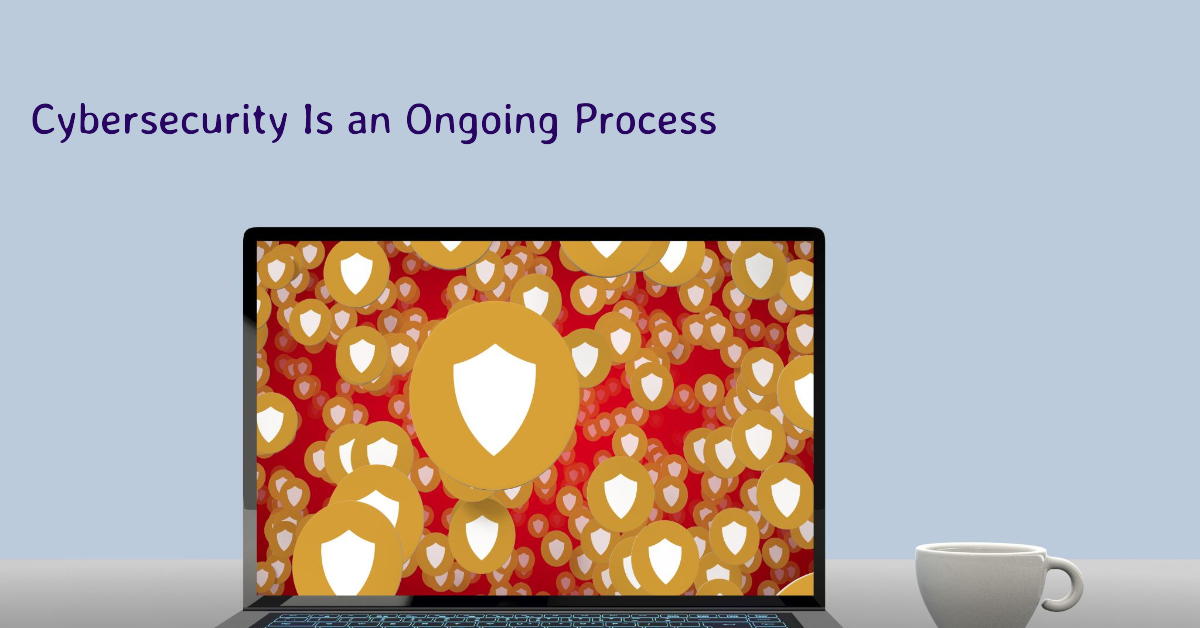The concept of cybersecurity is not new for the people of this era. However, still many authorities believe that installing firewalls and protecting accounts with passwords are enough measures to keep security issues at bay. These are not even the bare minimum-security measures and hackers can disregard them easily.
Cyber-attacks usually become successful when authorities treat cybersecurity as a remedy after some attack or breach. You should instead take it seriously and invest in it regularly to keep all threats and attack attempts at bay.
Get into the details of this article to learn and explore why you should treat cybersecurity as an ongoing process and take the appropriate measures for it.
Top 5 Reasons Cybersecurity Is an Ongoing Process
Cybersecurity is inevitable for every business setup in this advanced era. However, most authorities use it like a band-aid which they can use when some attack occurs. Instead, it should be used as a protection aid as the sportsmen wear helmets and gloves before getting on the game ground to protect themselves from potential harm and injuries. Treating cybersecurity as an ongoing process and not a remedy can significantly flourish its growth too.
Here are the major reasons organizations should treat cybersecurity as an ongoing process and not just a single-time remedy.
Threat Advancement
Threat advancement is the first and foremost reason organizations should take cybersecurity as an ongoing process. Hackers and cybercriminals are well aware of the advancements in cybersecurity. So, they also follow the strategies to launch even more damaging attacks.
In other words, if you have optimized security for a specific threat, the hackers will come back with a stronger attack. You need to be well-prepared to deal with the expected and unexpected attacks which is only possible with ongoing cybersecurity. Many organizations hire cybersecurity company in Dubai and let experts optimize their security to deal with advanced threats continuously.
Evolving Business Needs
Evolving business needs are the next reason organizations should take cybersecurity as an ongoing process. Online presence is inevitable for any business which means it will be dependent on some software and operating system. As the business progresses, you will need to upgrade your software and operating system according to the evolving needs.
Once you do so, you will also need to upgrade its security and install updates and other necessary measures. Neglecting these will only favor the criminals who might launch attacks, access confidential data, and sell it to malicious third parties. So invest in cybersecurity and opt for continuous support to secure it against potential threats.
Regulatory Compliances
Regulatory compliance is the next typical reason to treat cybersecurity as an ongoing process. With the ever-advancing threat landscape, the government authorities introduce new laws and regulations for threat protection strategies. They do require the cooperation of business organizations and concerned authorities to ensure law enforcement and peace.
Implementing the required security compliance once is not enough. The business setups and other entities need to ensure they are consistently following the compliance regulations. It will not only protect the business and its users from cyber threats, but the authorities will also not have to deal with penalties for non-compliance. All of this is only possible with consistent cybersecurity measures and support.
Persistent Vulnerabilities
Persistent vulnerabilities are the next reason for organizations to take cybersecurity as an ongoing process. Even if your network and devices have perfect cybersecurity at the moment, it does not mean it will be the same tomorrow or the day after that. Hackers keep trying to launch attacks on the networks to gain access.
Even if an attack fails, it can create a vulnerability in your system which can facilitate further attacks. With optimized and consistent cybersecurity support, you can monitor the devices and networks for vulnerabilities around the clock. It can enable you to find and fix vulnerabilities before hackers do and exploit them. So, take essential measures and protect your setup.
Quick Incident Response
Quick incident response is the last reason organizations should treat cybersecurity as an ongoing process. In case of cyber threats, the authorities need to assess the situation quickly and revert it. Once the attack is launched, the authorities must have a proper framework of necessary steps and actions to control and reverse the damage.
All of this is impossible if you treat cybersecurity as a single-time remedy and not an ongoing process. You will lack quick incident response and proper support to contain the damages. If you want to optimize your security, it is impossible without optimizing incident response. You can hire experts from a cybersecurity company in Dubai to implement necessary measures and provide reliable incident response support.
Conclusion
In today’s fast-paced digital landscape, treating cybersecurity as an ongoing process is not just a best practice—it’s a necessity. The ever-evolving nature of cyber threats demands constant vigilance and proactive measures to safeguard your business’s assets, reputation, and bottom line. By continuously updating your security protocols, staying compliant with regulatory standards, and preparing for swift incident responses, you can effectively mitigate risks and ensure the long-term success of your organization.
Investing in ongoing cybersecurity is an investment in the future stability and growth of your business. Don’t wait for a breach to highlight vulnerabilities; take action now to build a robust security framework. Consult with cybersecurity experts, implement the necessary measures, and commit to regular updates and reviews. By doing so, you’ll not only protect your business but also build trust with your clients and stakeholders, positioning your company as a secure and reliable entity in the market.
Protect your business today and secure your future—make ongoing cybersecurity a core component of your operational strategy.








